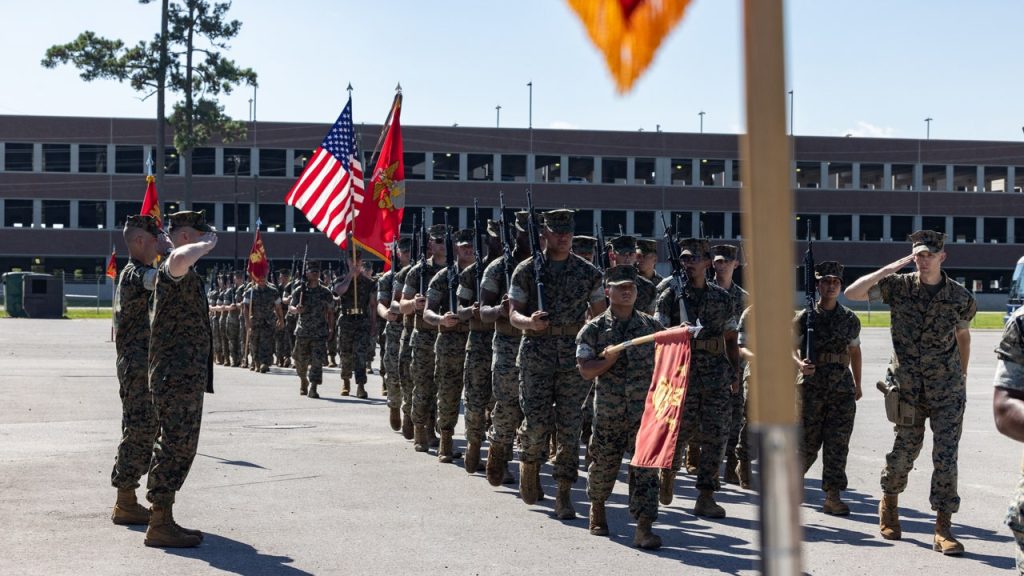In a significant move aimed at bolstering immigration enforcement, the U.S. Northern Command (USNORTHCOM) is deploying approximately 200 Marines to Florida to assist U.S. Immigration and Customs Enforcement (ICE). This deployment comes as part of a request made by the Department of Homeland Security (DHS) to relieve the operational burden on law enforcement agencies. The Marines will be tasked with non-law enforcement duties, focusing on administrative and logistical support rather than direct contact with individuals in ICE custody.
| Article Subheadings |
|---|
| 1) Overview of Marine Deployment |
| 2) Roles and Responsibilities of Deployed Marines |
| 3) Background Context: Previous Deployments |
| 4) Statements from Defense Officials |
| 5) Broader Implications of Military Involvement |
Overview of Marine Deployment
The Marine Corps is sending approximately 200 personnel from Marine Wing Support Squadron 272, based at Marine Corps Air Station New River in North Carolina, to support ICE operations in Florida. This deployment is part of a larger mobilization that includes about 700 active, National Guard, and reserve forces requested by Secretary of Defense Sean Parnell. This early wave of support is critical as ICE looks to manage its immigration enforcement obligations amidst increasing operational challenges.
The Marines are expected to arrive promptly in Florida, where they will align their efforts with the ongoing operations of ICE. This development marks a collaborative effort between federal military resources and immigration enforcement agencies to enhance efficiency and effectiveness in handling immigration matters.
Roles and Responsibilities of Deployed Marines
According to statements from USNORTHCOM, all service members involved in this deployment will perform strictly non-law enforcement duties. Their responsibilities will center around administrative and logistical functions, helping to streamline ICE operations without engaging in direct contact with detainees or the custody chain.
This delineation of duties is vital; it reassures critics and civil rights advocates who argue against military involvement in immigration enforcement. By restricting the Marines’ roles, officials aim to maintain a clear boundary between military functions and law enforcement, ensuring that the Marines support without infringing on civil liberties.
The deployment also allows ICE personnel to concentrate on direct law enforcement tasks, thereby enhancing overall operational capacity and allowing for better resource allocation.
Background Context: Previous Deployments
USNORTHCOM has been involved in multiple immigration enforcement strategies in recent years. Prior deployments, such as sending a battalion of Marines to Los Angeles in June, have sparked controversies and led to significant public discourse regarding the role of military forces in domestic law enforcement.
Previous criticisms, including those from government officials like California Governor Gavin Newsom, reflected concerns over the appropriateness of military involvement in civilian law enforcement. Following the earlier deployment, Governor Newsom even filed a lawsuit against the Trump administration, arguing that military presence in civilian situations can often escalate tensions and create unrest.
Statements from Defense Officials
Secretary of Defense Sean Parnell voiced strong support for the current deployment, underscoring its strategic importance. He indicated that the mobilization aims to relieve unnecessary strain on local law enforcement agencies that are often overwhelmed by their responsibilities.
“This support provides critical resources to support ICE’s mission, freeing up law enforcement personnel to focus on law enforcement tasks and missions,”
he stated.
Defense officials have reassured the public that the military’s involvement would enhance operational control along the southern border while maintaining strict adherence to ensuring proper handling of immigration protocols without infringing on individual rights.
Broader Implications of Military Involvement
The deployment of Marines as part of ICE support raises questions about the future of military involvement in immigration enforcement. It highlights a growing trend of utilizing military assets to assist in domestic law enforcement missions, thereby redefining traditional roles. This potential shift in military engagement can raise ethical and operational questions regarding the separation of military and civilian responsibilities.
Furthermore, as military units take an active part in enforcement narratives, public discourse may evolve regarding the appropriateness and effectiveness of such measures in tackling complex immigration issues. This narrative could also influence future policies, shaping how immigration enforcement is conducted at both local and national levels.
| No. | Key Points |
|---|---|
| 1 | US Northern Command is deploying 200 Marines to Florida to support ICE. |
| 2 | Assigned roles will strictly be non-law enforcement, focusing on administrative tasks. |
| 3 | Recent history includes previous military deployments related to immigration enforcement. |
| 4 | Statements from defense officials emphasize the importance of reducing strain on local law enforcement. |
| 5 | The growing trend of military involvement in civil affairs raises ethical considerations. |
Summary
The deployment of Marines in support of ICE is a notable event in the military’s ongoing involvement in domestic immigration enforcement. By providing logistical and administrative support, they aim to relieve the operational burdens on local law enforcement. This collaborative approach reflects both practical needs and broader implications concerning the military’s role in civil operations, emphasizing the delicate balance between enforcing immigration laws and maintaining civil liberties.
Frequently Asked Questions
Question: What is the purpose of the Marine deployment to Florida?
The purpose of the Marine deployment is to provide administrative and logistical support to ICE, helping to streamline operations and relieve local law enforcement agencies of some operational burdens.
Question: What roles will the deployed Marines perform?
The Marines will perform non-law enforcement duties focusing on administrative and logistical tasks, with strict prohibitions against direct contact with detainees.
Question: How does this deployment align with previous military actions related to immigration?
This deployment is part of a broader trend where military resources have been utilized to assist in immigration enforcement, which has previously generated public debate regarding the appropriateness of such involvement.


